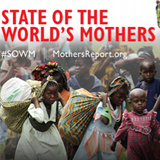
Every day around the world, 800 mothers and 18,000 children, including nearly 8,000 newborns, die from preventable and treatable causes. More than half of these deaths occur in crisis-affected places, where access to basic medical attention and care is at its weakest.
This year, Save the Children’s annual State of the World’s Mothers report focuses on mothers and children in humanitarian crises – from Typhoon Haiyan in the Philippines and Hurricane Sandy in the US, to mothers living in fragile or war-torn states like the Democratic Republic of Congo and Syria – in order to better understand and respond to their needs. The report examines the causes of maternal and child deaths in crisis settings, and suggests urgent actions needed to support mothers who are raising the world’s future generations under some of the most difficult and horrific circumstances imaginable.
The first day of life is the most dangerous day of a baby’s life, and in humanitarian crises the risks to newborns can multiply due to lack of skilled care, medicines and unsanitary conditions. Meeting the health and survival needs of mothers, newborns and children in humanitarian crises is challenging, but solutions do exist. Looking at trends in the Mothers’ Index so far this century, we see how armed conflict, political instability and natural disasters have played a major role in undermining the well-being of mothers and children in the world’s poorest countries. We also see that progress has been made in improving care during pregnancy and childbirth, even in countries suffering from devastating humanitarian crises.
- Find more on HNN’s Newborn Health in Emergencies Page
The report is a call to States, donors and civil society to:
-
Ensure that every mother and newborn living in crisis has access to high quality health care;
-
Invest much more in women and girls and ensure their protection;
-
Build stronger institutions and promote early action, social protection, disaster risk reduction and strong health systems that provide universal health coverage and provide for the most vulnerable;
-
Design emergency interventions with a longer-term view and the specific needs of mothers and newborns in mind;
-
Ensure political engagement and adequate financing, coordination and research around maternal and newborn health in crisis settings.